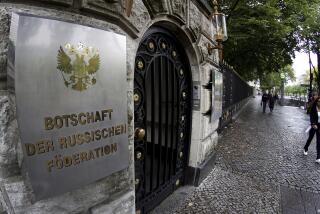Soviet Troops Now Viewed as Guests in New German Treaties
BERLIN — The German Parliament on Tuesday took another step in unwinding the Cold War era by approving two treaties governing the withdrawal of Soviet military forces from the eastern part of the country by the end of 1994.
By an overwhelming majority, the Bundestag, meeting in Bonn, passed one treaty that effectively alters the status of the 380,000 Soviet troops stationed in eastern Germany from that of a de facto occupying force to that of invited guests.
The new status subjects Soviet forces to German law and regulations in much the same way as British, French and American military units operate in the western part of the country.
“For the remaining period of their presence in the Federal Republic of Germany, the Soviet soldiers and civilians are guests on our territory,” Foreign Minister Hans-Dietrich Genscher told Parliament. “They are not occupation troops.”
The lawmakers also approved a second treaty providing for a $9-billion package to finance the return of the Soviet forces and their dependents to the Soviet Union over the next four years.
Including dependents, some 600,000 persons are involved in the withdrawal.
Both treaties, signed earlier this month by both countries, now move to the upper house, the Bundesrat, where they are expected to win routine ratification.
In addition to the cost of transporting the contingent home, the financial package includes the cost of new housing required in the Soviet Union because of the troop shift and the retraining of Soviet personnel for civilian tasks at home.
On top of this agreement, the Germans have also provided Moscow with a $1.9-billion interest-free loan to meet the cost of maintaining the Soviet forces through the withdrawal period.
Moscow won the lucrative aid package in tough negotiations last month as the price for agreeing to a fixed four-year withdrawal period.
While some German opposition politicians have complained about the costs, members of Chancellor Helmut Kohl’s center-right coalition strongly defended the accords.
“This money is well spent,” declared Parliament member Adolf Roth, a Christian Democrat, during the debate.
It was a year ago, on Nov. 9, that the Berlin Wall collapsed, beginning a chain reaction of political events that led to the agreement on the Soviet withdrawal and the reunification of the two Germanys earlier this month.
The former Communists, now called the Democratic Socialists, a few members of the left-leaning Greens and Alliance 90 parties and one member of Kohl’s own Christian Democrats abstained during the voting.
In a dispatch Tuesday, the German news agency Deutsche Presse-Agentur quoted a Soviet Lt. Gen. Mityuchin, identified as commander of the 3rd Soviet Army based in Magdeburg, as saying two of the 20 Soviet divisions were already demobilizing.
More to Read
Sign up for Essential California
The most important California stories and recommendations in your inbox every morning.
You may occasionally receive promotional content from the Los Angeles Times.










